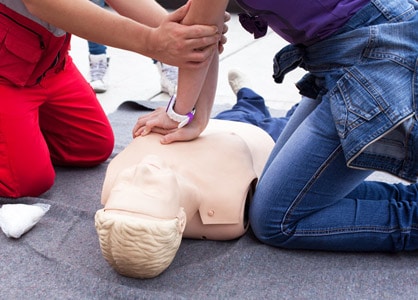Accidents are unforeseeable and can happen anywhere, anytime. Having the knowledge and skills to provide immediate medical assistance in the form of first aid can make all the difference in such situations, but who needs first aid training? In this blog, we’ll look at who needs first aid training and the various groups of people who can benefit immensely from this invaluable skill.
Teachers and School Staff
Schools are bustling environments with dozens of staff members and hundreds of students present at any one time. As such, both the classroom and the playground can easily invite accidents, from simple trips and scrapes to more serious issues such as fainting, someone suffering an allergic reaction or even a fit from an existing medical condition.
This is where teachers and school staff equipped with first aid skills step in. They can administer timely aid, not only soothing the injured child but also preventing the situation from worsening. Their preparedness ensures that learning environments remain as safe as they are enriching.
Construction Workers
Construction sites are filled with more physical hazards than the average workplace. Construction workers often work at height, carry heavy materials and handle dangerous tools. Construction sites, while essential, pose significant risks to workers due to the nature of the job.
Construction workers trained in first aid become a crucial line of defence against accidents. They can provide immediate care until professional medical help arrives, which can often be the difference between life and death.
Workplace Employees
It’s not just specific industries that benefit from first aid training. Every workplace has its set of potential hazards. From traditional office spaces to factories, being prepared to handle injuries or medical emergencies is paramount, and having trained first aiders on site can be the difference between a simple short-term injury and permanent damage or worse.
Employers who provide first aid training exhibit a commitment to their employees’ well-being while also complying with all necessary regulations. First aid training can also be another feather in the cap of any employee who wants to be a more valuable asset to their team.
Parents and Caregivers
A scraped knee during playtime or a sudden fever in the middle of the night – children are prone to unpredictable health issues. Parents and caregivers trained in first aid are better equipped to handle such situations and can also reduce the dependence on emergency services which are often stretched.
The ability to provide immediate assistance brings not only relief but also peace of mind, allowing them to react calmly and effectively.
Childcare Providers
Childcare providers shoulder a great responsibility – the safety and well-being of young children. First aid training can be an integral part of a childcare provider’s skill set that also makes them more desirable to employers and parents seeking childcare. It enables them to respond swiftly to accidents, from minor cuts to more serious incidents. The confidence to act in times of crisis can significantly minimise the impact of an accident.
Outdoor Enthusiasts and Sportspeople
The call of the wild draws many to outdoor activities and extreme sports. However, these pursuits come with their own set of risks, whether the activity is a leisurely hike through the hills or an extreme rock climbing session.
First aid training becomes essential for those venturing into remote areas or engaging in adrenaline-pumping activities. The knowledge to stabilise an injury until professional help arrives can mean the difference between a rescue and a catastrophe.
First Aid Training for Everyday Life
While some individuals need first aid training as a part of their professional requirements, it goes beyond that. Everyday life presents us with unexpected situations. Knowing how to respond can prove crucial in various scenarios, from helping a fellow commuter in distress to aiding a neighbour until paramedics arrive.
The benefits of first aid training extend beyond the immediate medical aspect. The confidence that comes with knowing how to react in emergencies is invaluable. It transforms ordinary individuals into potential lifesavers, fostering a sense of empowerment and community involvement.
There are misconceptions that only medical professionals need first aid training. However, emergencies can arise anywhere, and immediate action is crucial. Dispelling these myths encourages a broader segment of the population to get trained and be ready to help.
Choosing the Right Training
With various courses available, it’s essential to select the training that aligns with your needs. Basic first aid, CPR training, and specialised courses cater to different situations. Tailoring your training ensures that you’re equipped with the right skills to make a difference when it counts.
Promoting First Aid Awareness
Raising awareness about the importance of first aid training is essential. Encouraging friends, family, and colleagues to undergo training can create a network of individuals ready to assist in emergencies. Spreading the message is a collective effort towards safer communities.
In a world where accidents are inevitable, first aid training emerges as a powerful tool. From teachers moulding young minds to outdoor enthusiasts embracing adventure, the scope of beneficiaries is vast. The ability to provide immediate assistance not only saves lives but also instils confidence. So, who needs first aid training? The answer is simple – everyone.
If you have any questions about first aid training or would like to book a course, please get in touch.




